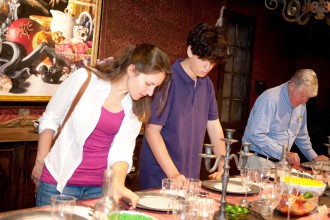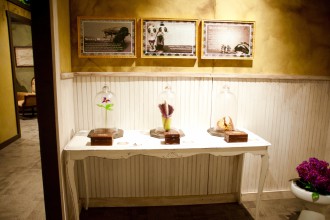From afar, the statue of Frederick Law Olmsted that commands the center of the N.C. Arboretum’s formal gardens seems the embodiment of strength. The 8-foot-tall bronze by sculptor Zenos Frudakis shows the father of American landscape architecture as broad-shouldered and magnificently bearded. But a closer look betrays a weakness — his eyes are squinting, straining hard to see the landscape his mind imagines.
An explanation for Olmsted’s vision problems can be found just down the path from his statue. As described by “Wicked Plants: The Exhibit,” the master of plant placement was nearly blinded as a young man by poison sumac and suffered optical issues throughout the rest of his life. His story is just one tale of botanical woe among the many on display in the exhibit, which returns to the arboretum’s Baker Exhibit Center through Jan. 7.
Originally debuted by the arboretum in 2012, “Wicked Plants” brings to life the New York Times best-selling book, Wicked Plants:The Weed That Killed Lincoln’s Mother and Other Botanical Atrocities by Amy Stewart, published in 2009. Her compendium of fiendish flora is reimagined in the exhibit as a foreboding Victorian manor filled with interactive elements to teach visitors of all ages about the most dangerous members of the vegetable kingdom.
“Botanical gardens and museums all have poisonous plants in their collections, but they’ve always been sort of nervous about them,” says Stewart. “They never really wanted to talk about them before, but this exhibit gives them the permission to run with it. They can have a dead body in the room and have that be fun.”
Interacting with the icky
Stewart isn’t exaggerating: The exhibit’s “potions laboratory” features a mannequin of a gray-haired woman named Bella, slumped lifeless over a table in her dressing gown. Guests are tasked with scouring the laboratory for clues to determine how plants played a role in Bella’s death. The experience of peeking in a fireplace and opening drawers to puzzle out a solution feels more like an escape room than a typical museum display, which Stewart says is particularly appealing to younger visitors.

“In most museums, even science museums, a lot of exhibits feel like ‘look at the thing in the box,’” Stewart says. “Kids love uncovering a mystery, and the spookier and creepier it is, the more attractive it is.”
Other parts of the exhibit continue the hands-on approach, from a showcase of psychoactive plants with a perspective-altering funhouse mirror to a dining room tableau that challenges guests to match the common foods on the table with their potential toxic effects. The manor’s bathroom even hosts a smell station with botanically derived scents of wet dog and rotting meat.
The more traditional text displays in “Wicked Plants” still aim to engage audiences through stories rather than simple description. “As a writer, I know that if I just list a bunch of facts, everyone’s going to go to sleep,” says Stewart. “But if I tell the crazy story about how Abraham Lincoln’s mother died from drinking the milk of a cow that ate white snakeroot, people will remember that and go tell other people.”
Shaping the spooky
Beyond its content, “Wicked Plants” is unique in being the first traveling display developed by the arboretum. Whitney Smith, marketing and public relations manager, explains that creating the exhibit was something of a leap of faith. “This was right during the recession, and our budget got cut because we’re a state organization,” says Smith. “We had to rely on our nonprofit side, the North Carolina Arboretum Society, to fund the initial $250,000 investment.”

That bold decision proved to be a success. “Wicked Plants” filled a gap in midsize traveling exhibits for science museums, particularly as school groups sought experiences that tied science with literature and history to address Common Core curriculum standards. Since launching the exhibit, the arboretum has rented “Wicked Plants” to other institutions across the country, from the Springs Preserve Museum in Las Vegas to the Florida Museum of Natural History in Gainesville.
Wherever it goes, the display comes with a bit of Asheville spirit. Many of the clever details throughout the exhibit, such as the labels on the medicine bottles and books that fill the house’s shelves, were produced by area craftspeople. “One of the missions of the arboretum is economic development, and we focused on locally sourced artists and manufacturers, because we were in that economic downturn,” Smith says. “Wicked Plants” is also designed so that its walls double as packing crates for its contents — the entire exhibit fits into a single tractor-trailer, reducing the carbon footprint of rentals.
Facing the fearsome
Although the exhibit itself doesn’t contain any live specimens, visitors can see some of the mentioned species throughout the arboretum grounds during the run of “Wicked Plants.” The poisonous vine Gelsemium sempervirens (Carolina jessamine), carnivorous Dionaea sp. and Sarracenia sp. (Venus flytraps and pitcher plants) and beautiful but toxic Digitalis pupurea (foxglove) will all be on display. Many species that grow wild in the region, such as Toxicodendron sp. and Urtica sp. (stinging nettles), also earn the “wicked” designation.
Stewart hopes that people leave their encounter with “Wicked Plants” with a healthier respect for the potency of the natural world. “People forget that plants have to defend themselves, just like animals do,” she says. “But because they can’t run away, all they can do is inflict pain and suffering on things that want to eat them — it’s a miracle that we can eat any plants at all.”
WHAT: “Wicked Plants: The Exhibit”
WHERE: The North Carolina Arboretum, ncarboretum.org
WHEN: Daily through Jan. 7, 9 a.m.–5 p.m. Free with arboretum parking.



Before you comment
The comments section is here to provide a platform for civil dialogue on the issues we face together as a local community. Xpress is committed to offering this platform for all voices, but when the tone of the discussion gets nasty or strays off topic, we believe many people choose not to participate. Xpress editors are determined to moderate comments to ensure a constructive interchange is maintained. All comments judged not to be in keeping with the spirit of civil discourse will be removed and repeat violators will be banned. See here for our terms of service. Thank you for being part of this effort to promote respectful discussion.